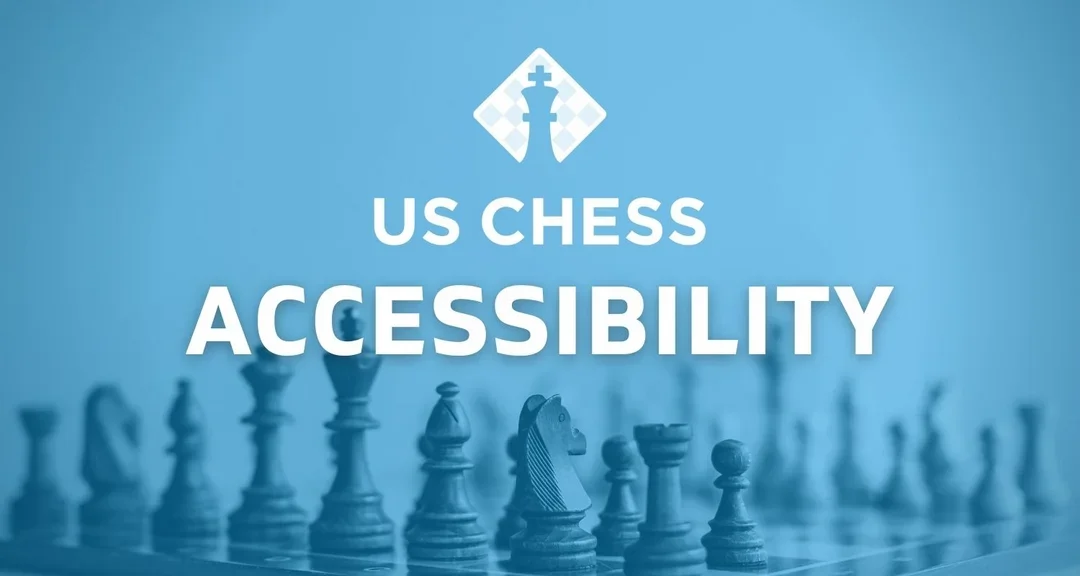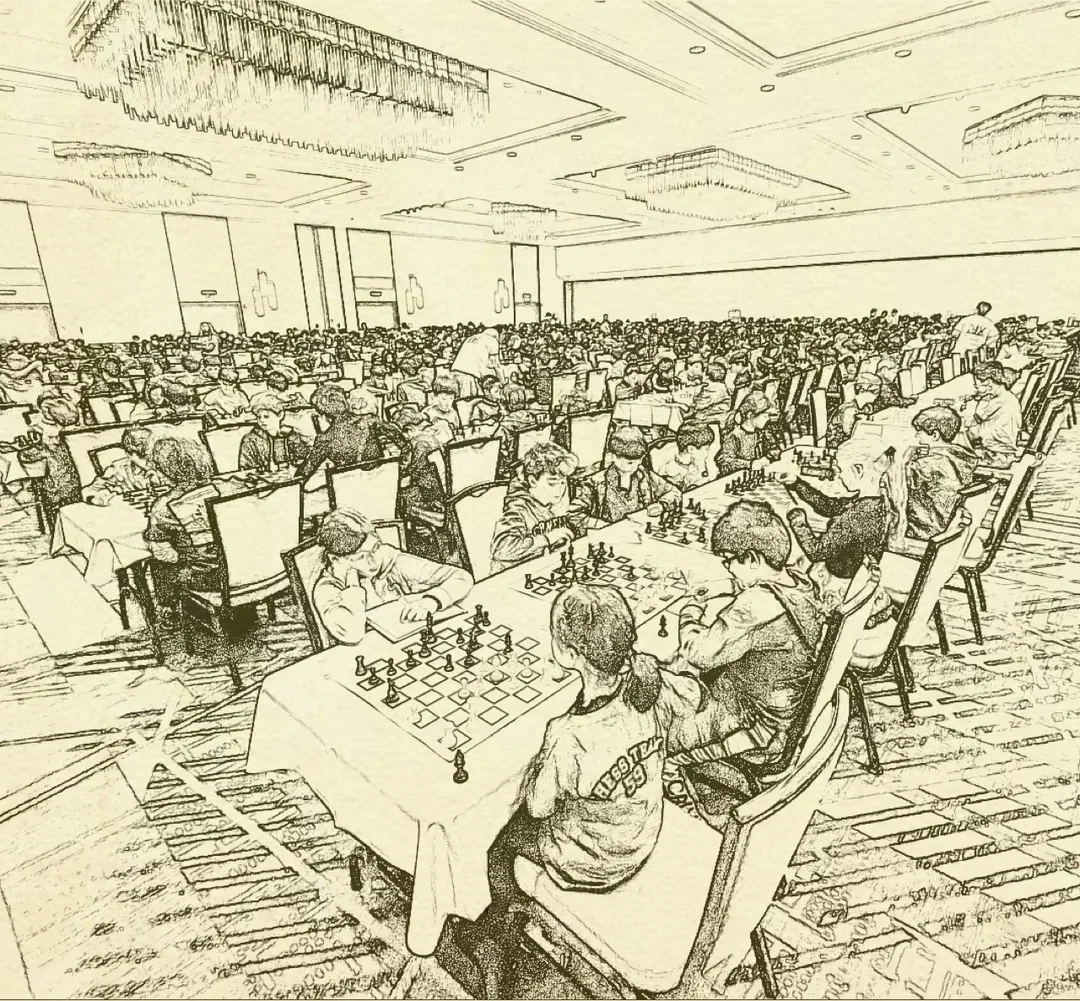
The game of chess has maintained the interest of humans, regardless of gender, age, religion, culture, and financial status, from when it was known as thaayam to chaturanga to petteia to shatranj to the modern game. Requiring knowledge of a chess board and pieces, as well as the rules, this strategy puzzle has been used for everything from entertainment to establishment of intellectual prowess, to wartime strategy warm-ups. Moreover, with the addition of an independent rating system, based on performance in competition, the “common playing field” is more level than most other competitive endeavors.
Chess is well-suited for almost all players who would like to learn, play, and compete– regardless of (dis)ability. So long as the rules can be learned, anyone can play. With this logic in mind, it stands as a guiding philosophy of US Chess that “Everyone has a seat at the chess table.” When this logic and history are combined with the current Psychology and Education data, we have direction. Inclusion through accommodation is best practice, and hence a pathway opens for the chess community to put more chairs at the chess table.
The Accessibility & Special Circumstances Committee (ASCC) came to be via a 2015 vote by the US Chess delegates, and was first under the direction of Janelle Losoff. This committee has worked very hard to create Accessibility Guidelines that define what accommodations might be needed and given based on the principle that all chess players should be treated with respect and fairness. Whether a player has a broken hand and needs help with notation and moving the pieces, or is legally blind and requires either a particular board, set, and clock or a game assistant, the game and rules of chess are followed precisely. In requesting and providing accommodations, the rules of chess can not be altered so that any one player has an advantage.

Over the next several months, we will share with you what we have been working on, so as to include the larger chess community in the conversation regarding ways to be open and inclusive. We aim to focus on what reasonable accommodations can be made, not on what specific disability a chess player is playing with. Regardless of whether the disability is visible/ invisible, physical/cognitive, developmental/age-based, or temporary/permanent, many of the accommodations are similar. For example, creating more aisle space and maintaining a board number and placement is an easy and useful accommodation for a player who uses a wheelchair, needs easy access to a bathroom, requires an extra chair to prop up a leg that is in a cast, or has a documentable disability for which having a bit of extra space creates an even playing context.
Knowing what accommodations to ask for, along with the how, when, and where, are just as important as knowing that accommodations CAN be asked for. Not every accommodation can be granted, but the ASCC is working hard to help US Chess tournament organizers, directors, players, and community members create a transparent protocol that increases participation, without increasing opportunities for dishonest play, and separately, increasing costs prohibitively for the tournament organizer and/or the player. We encourage the tournament organizer and director to work with each player to explore the range of specific options that could satisfy the individual player’s accommodation needs.
In our next article, we will start with a discussion of examples of what disabilities are temporary versus permanent, along with what is needed to request an accommodation. Chess is a game of constant learning and exploration. The more people who are playing, the more we all learn! As chess has evolved throughout the past, it continues to do so currently, e.g., Chess 960, and many other, newer variations. Embracing the minds of all who have, and will play, ensures the future of chess.
For more on the work of the ASCC, please visit our page on Accessible Chess Events Guidelines.
Categories
Archives
- December 2025 (26)
- November 2025 (29)
- October 2025 (39)
- September 2025 (27)
- August 2025 (29)
- July 2025 (43)
- June 2025 (25)
- May 2025 (24)
- April 2025 (29)
- March 2025 (29)
- February 2025 (20)
- January 2025 (24)
- December 2024 (34)
- November 2024 (18)
- October 2024 (35)
- September 2024 (23)
- August 2024 (27)
- July 2024 (44)
- June 2024 (27)
- May 2024 (31)
- April 2024 (51)
- March 2024 (34)
- February 2024 (25)
- January 2024 (26)
- December 2023 (29)
- November 2023 (26)
- October 2023 (37)
- September 2023 (27)
- August 2023 (37)
- July 2023 (47)
- June 2023 (33)
- May 2023 (37)
- April 2023 (45)
- March 2023 (37)
- February 2023 (28)
- January 2023 (31)
- December 2022 (23)
- November 2022 (32)
- October 2022 (31)
- September 2022 (19)
- August 2022 (39)
- July 2022 (32)
- June 2022 (35)
- May 2022 (21)
- April 2022 (31)
- March 2022 (33)
- February 2022 (21)
- January 2022 (27)
- December 2021 (36)
- November 2021 (34)
- October 2021 (25)
- September 2021 (25)
- August 2021 (41)
- July 2021 (36)
- June 2021 (29)
- May 2021 (29)
- April 2021 (31)
- March 2021 (33)
- February 2021 (28)
- January 2021 (29)
- December 2020 (38)
- November 2020 (40)
- October 2020 (41)
- September 2020 (35)
- August 2020 (38)
- July 2020 (36)
- June 2020 (46)
- May 2020 (42)
- April 2020 (37)
- March 2020 (60)
- February 2020 (38)
- January 2020 (45)
- December 2019 (34)
- November 2019 (35)
- October 2019 (42)
- September 2019 (45)
- August 2019 (56)
- July 2019 (44)
- June 2019 (35)
- May 2019 (40)
- April 2019 (48)
- March 2019 (61)
- February 2019 (39)
- January 2019 (30)
- December 2018 (29)
- November 2018 (51)
- October 2018 (45)
- September 2018 (29)
- August 2018 (49)
- July 2018 (35)
- June 2018 (31)
- May 2018 (39)
- April 2018 (31)
- March 2018 (26)
- February 2018 (33)
- January 2018 (30)
- December 2017 (26)
- November 2017 (24)
- October 2017 (30)
- September 2017 (30)
- August 2017 (31)
- July 2017 (28)
- June 2017 (32)
- May 2017 (26)
- April 2017 (37)
- March 2017 (28)
- February 2017 (30)
- January 2017 (27)
- December 2016 (29)
- November 2016 (24)
- October 2016 (32)
- September 2016 (31)
- August 2016 (27)
- July 2016 (24)
- June 2016 (26)
- May 2016 (19)
- April 2016 (30)
- March 2016 (36)
- February 2016 (28)
- January 2016 (32)
- December 2015 (26)
- November 2015 (23)
- October 2015 (16)
- September 2015 (28)
- August 2015 (28)
- July 2015 (6)
- June 2015 (1)
- May 2015 (2)
- April 2015 (1)
- February 2015 (3)
- January 2015 (1)
- December 2014 (1)
- July 2010 (1)
- October 1991 (1)
- August 1989 (1)
- January 1988 (1)
- December 1983 (1)







